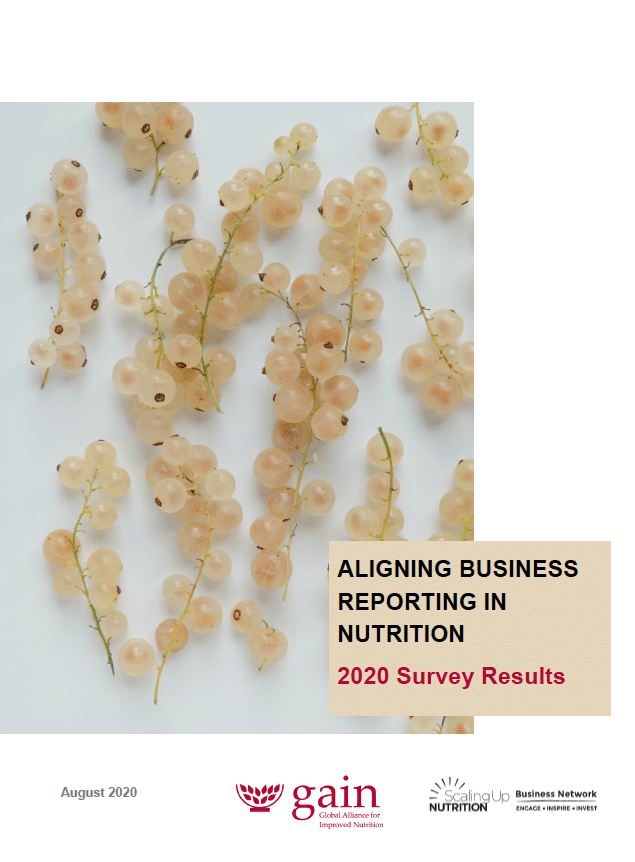According to the 2020 Global Nutrition Report , “one in every nine people in the world is hungry, and one in every three is overweight or obese.” [1] With the private sector being the provider or the producer of our food, it seems therefore logical and critical to have strong business accountability to support better practices of business for better nutrition. However, a recent report from Carrots & Sticks led by the Global Reporting Initiative and the University of Stellenbosch Business School identified Sustainable Development Goal (SDG) 2 ( ending hunger, achieve food security and improved nutrition and promote sustainable agriculture) as the thematic SDG with the lowest number of reporting provisions. According to the authors, “since reducing poverty and hunger tend not to be explicit goals of commercial enterprises, it is perhaps unsurprising that few reporting provisions promote disclosure by business on these broad themes.” [2]
In this context, the Global Alliance for Improved Nutrition (GAIN) and the Scaling Up Nutrition Business Network (SBN) have been looking at the challenges and opportunities of the current business accountability landscape for nutrition. In a 2019 report [3] , they identified the lack of alignment for current business reporting on nutrition as a key barrier for more efficiency of business reporting on nutrition. As indicated by the Carrots & Sticks report, business reporting on malnutrition is low and it is also done across a wide variety of different methodologies. By having businesses and accountability mechanisms using a limited set of existing reporting tools, we could access reliable data on nutrition with lower amount of resources allocated to reporting. The results of a survey GAIN/SBN launched in May 2020 around a set of pre-existing reporting tools [4] showed that there is some level of consensus in aligning current business reporting on nutrition. The respondents (29 of which 21 are business representatives) ranked the following existing reporting tools – among the ones suggested – as being the most relevant to report business impact on respectively product (re)formulation, marketing to children, food labelling and employee health and wellbeing (with a focus on workforce nutrition):
- The Health Star Rating System
- The Core Principles of the Children’s Food and Beverage Advertising Initiative
- Relevant Codex Alimentarius Standards on Labelling
- The Workforce Nutrition Alliance Scorecard
and considered as relevant/very relevant for business reporting the following tools:
- The Global Food Safety Initiative (GFSI) benchmarking requirements (scored very relevant/relevant by 92% of the respondents to this question).
- The Food Loss and Waste Accounting and Reporting Standard (scored very relevant/relevant by 91% of the respondents to this question).
The comments provided by the respondents reflected the need for more discussions for companies to commit to using these reporting indicators. Current and future accountability mechanisms will also need to align some of their methodologies to provide consistent information.
The low number of nutrition related indicators in current non-financial reporting can be considered as an opportunity. Businesses, as well as accountability mechanisms and the public sector, can align their requirements for business reporting on nutrition. To identify what needs to change and what practices we can build on for better nutrition, we need to understand business impact on nutrition. This means data that are reported against transparent and recognised methodologies, data that enable us to compare practices and impact across similar products and portfolio. Aligned business reporting on nutrition will not necessarily translate into better business impact on nutrition but without it, we will not be in a position to ask businesses to play their part or to reward best practices.
If you would like to provide feedback on this report and actively support better and more aligned business reporting on nutrition please contact GAIN/SBN la*****@ga********.org . GAIN/SBN will publish a summary of the feedback provided on this report as well the overall conclusions of its work on better business accountability by the end of 2020.
[1] “2020 Global Nutrition Report: Action on equity to end malnutrition”. Bristol, UK: Development Initiatives. Retrieved 7 September https://globalnutritionreport.org/reports/2020-global-nutrition-report/
[2] “Sustainability reporting policy: Global trends in disclosure as the ESG agenda goes mainstream”, Carrot and Sticks 2020. Retrieved 7 September 2020 https://www.carrotsandsticks.net/
[3] “A review of business accountability mechanisms in nutrition”, Global Alliance for Improved Nutrition, March 2019. Retrieved 9 September 2020 https://www.gainhealth.org/sites/default/files/publications/documents/review-of-business-accountability-mechanisms-in-nutrition-report-2019.pdf
[4] “Aligning business reporting in nutrition. 2020 Survey Results”, Global Alliance for Improved Nutrition/ SUN Business Network. Retrieved 7 Septemberhttps://www.gainhealth.org/sites/default/files/publications/documents/aligning-business-reporting-in-nutrition-2020-survey-results.pdf











